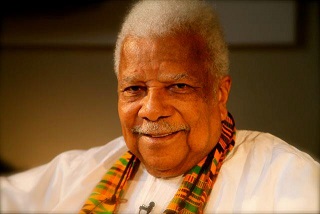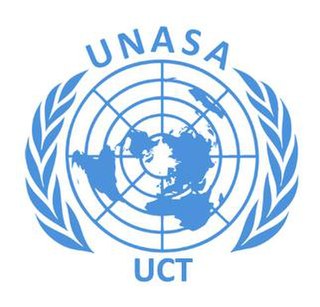
International Relations (IR), are the interactions among sovereign states. The scientific study of those interactions is also referred to as international studies, international politics, or international affairs. In a broader sense, the study of IR, in addition to multilateral relations, concerns all activities among states—such as war, diplomacy, trade, and foreign policy—as well as relations with and among other international actors, such as intergovernmental organizations (IGOs), international nongovernmental organizations (INGOs), international legal bodies, and multinational corporations (MNCs).

Bhisho, formerly Bisho, is the capital of the Eastern Cape province in South Africa. The Office of the Premier, Provincial Legislature and many other government departments are headquartered in the town. The town, three kilometres from Qonce and 70 kilometres from East London, is also part of Buffalo City.
The University of the Third Age (U3A) is an international movement whose aims are the education and stimulation of mainly retired members of the community — those in their third 'age' of life.
Dieter Felix Gerhardt is a former commodore in the South African Navy and commander of the strategic Simon's Town naval dockyard. He was arrested by the FBI in New York City in 1983 following information obtained from a Soviet defector. He was convicted of high treason as a spy for the Soviets for a period of twenty years in South Africa together with his second wife, Ruth, who had acted as his courier. Both were released prior to the change of government following the 1994 general election.

Ali Al'amin Mazrui, was a Kenyan-born American academic, professor, and political writer on African and Islamic studies, and North-South relations. He was born in Mombasa, Kenya. His positions included Director of the Institute of Global Cultural Studies at Binghamton University in Binghamton, New York, and Director of the Center for Afro-American and African Studies at the University of Michigan. He produced the 1980s television documentary series The Africans: A Triple Heritage.

Israel–South Africa relations refer to the current and historic relationship between the Republic of South Africa and the State of Israel. As of January 2024, South Africa maintains only “limited political and diplomatic interaction” with Israel due to the ongoing Israeli–Palestinian conflict.
Moussa Okanla was a Beninese scholar and diplomat. Okanla was appointed Minister of Foreign Affairs in the government named on 17 June 2007, and was replaced by Jean-Marie Ehouzou on 22 October 2008.
Politics is the process by which groups of people make decisions. Although the term is generally applied to behavior within civil governments, politics is observed in all human group interactions, including corporate, academic, and religious institutions. Politics consists of "social relations involving authority or power. The definition of "politics" from "The Free Dictionary" is the study of political behavior and examines the acquisition and application of power. Politics study include political philosophy, which seeks a rationale for politics and an ethic of public behavior, and public administration, which examines the practices of governance.

The United States and South Africa currently maintain bilateral relations with one another. The United States and South Africa have been economically linked to one another since the late 18th century which has continued into the 21st century. United States and South Africa relations faced periods of strain throughout the 20th century due to the segregationist, white minority rule in South Africa, from 1948 to 1994. Following the end of apartheid in South Africa, the United States and South Africa have developed a strategically, politically, and economically beneficial relationship with one another and currently enjoy "cordial relations" despite "occasional strains". South Africa remains the United States' largest trading partner in Africa as of 2019.

Russia–South Africa relations are foreign relations between Russia and South Africa. Full diplomatic relations were established between both countries in 1942 as the Soviet Union. Russia has an embassy in Pretoria and a consulate-general in Cape Town. South Africa has an embassy in Moscow. Both countries are also members of BRICS.
Pax Ludens is a non-profit organization specialized in training and research on international conflict and crisis management. The mission of the organization is to help future decision makers tackle complex international political dynamics and excel in conflict management. The core activities are described as the design and execution of seminars and simulation exercises based on real and current case studies in the field of International Relations and conflict resolution. The programs offered challenge participants to explore various international political conflict scenarios and deal with crisis and conflict situations as events unfold.

Postcolonial international relations is a branch of scholarship that approaches the study of international relations (IR) using the critical lens of postcolonialism. This critique of IR theory suggests that mainstream IR scholarship does not adequately address the impacts of colonialism and imperialism on current day world politics. Despite using the language of post-, scholars of postcolonial IR argue that the legacies of colonialism are ongoing, and that critiquing international relations with this lens allows scholars to contextualize global events. By bridging postcolonialism and international relations, scholars point to the process of globalization as a crucial point in both fields, due to the increases in global interactions and integration. Postcolonial IR focuses on the re-narrativization of global politics to create a balanced transnational understanding of colonial histories, and attempts to tie non-Western sources of thought into political praxis.

Shael Polakow-Suransky is the president of the Bank Street College of Education. Previously, he was the New York City Department of Education Chief Academic Officer and Senior Deputy Chancellor.

The United Nations Association of South Africa University of Cape Town is an official chapter of the United Nations Association of South Africa (UNASA) and affiliated to the World Federation of United Nations Associations. UNASA UCT is a registered political society at the University of Cape Town. The aim of the society is to work in collaboration with various stakeholders in South Africa to promote and support the goals, vision and principles of the UN and its agencies.
Peter Vale is a senior research fellow at the Centre for the Advancement of Scholarship at the University of Pretoria, South Africa, and the Nelson Mandela Professor of Politics Emeritus at Rhodes University, South Africa. He is also an honorary professor at the Africa Earth Observatory Network (AEON) of which he was a founding member. Notably, Vale was the founding director of the Johannesburg Institute for Advanced Study (JIAS) and acting vice-rector for academic affairs and deputy vice-chancellor of the University of the Western Cape, South Africa. He has also received an honoury doctorate in the Humanities from the University of the Free State, South Africa.
Sasha Polakow-Suransky is an American journalist and author. He is the deputy editor of Foreign Policy, and a former editor of The New York Times op-ed page and former senior editor of Foreign Affairs.
The International Federation of Workers' Education Associations (IFWEA) is an international organisation of associations, foundations, non-governmental organisations and trade unions involved in adult education for working people. It is based in Cape Town, South Africa, is an observer at the International Labour Organisation and UNESCO and is a member of SOLIDAR.

Steven C. Roach is an American professor of International Relations who writes on global ethics, the politics of international law, critical international theory, minority rights, and South Sudan's politics. He is Professor of International Relations and former Director of Graduate Programs at the School of Interdisciplinary Global Studies at the University of South Florida.
Jonathan Wilkenfeld is an American political scientist and professor emeritus at University of Maryland, specialized in foreign policy, terrorism and simulation methodology in political science. He is the Founding Director of the International Communication and Negotiation Simulations Project.

Desert War: Tactical Warfare in North Africa is a board wargame published in 1973 by Simulations Publications, Inc. (SPI) that simulates combat in North Africa during World War II..










